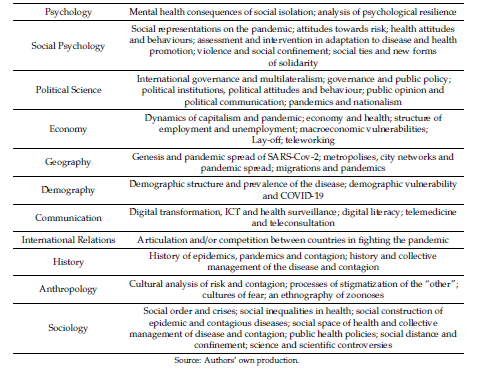This entry seeks to provide an answer to the question of what is the relevance of Social Sciences for understanding the multiple implications and challenges posed by the COVID-19 contagion pandemic.
- COVID-19
- social sciences
- pandemic
- contagion
- inequality
- digital society
Introduction
Following Ferreira, Sá, Martins and Serpa (2020), Coronaviruses (CoV) entail a large group of viruses, some of which are pathogenic to humans, whose infections are usually associated with clinical respiratory manifestations, without high severity. The COVID-19 pandemic is generating a global threat. This pandemic has most significantly affected the older population and/or individuals with respiratory complications and other similar pre-existing diseases.
The vast majority of countries (yet not all) have imposed a set of preventive procedures and devices, in addition to medical tests, namely isolation, quarantine, community containment and physical distancing, travel restrictions, hand hygiene and the banning of events and gatherings. These measures have led to the temporary closure of several economic and social institutions, a relative national lockdown in several countries and enormous pressure on health systems. The impacts of the COVID-19 pandemic are multiple: social, economic, health, political, educational, on labour and employment, ethnic-racial, on freedom and on citizenship rights. Furthermore, there is a growing increase in inequalities and even poverty and exclusion.
The uncertainties and partial mistrust of medical knowledge and information, together with the publication of conspiracy theories, have also added some disturbances, which are characteristic of uncertainty/unpredictability, and the lack of self-control in the relationship with oneself and with others has also emerged. These various measures have a profound impact on everyday life, and the future consequences for the reconfiguration of social life are in the increasingly digital society.
Social Sciences and COVID-19 Contagion
The pandemic, as a global threat, is, therefore, imbued with a constant state of crisis, in which the crisis becomes permanent and the cause that explains everything. This global threat has an epidemiological and medical dimension, but also a political and governance one. The clinical and epidemiological approaches imbricate to a political component (power, violence, constraint) and a governance component (state structure, governments’ behaviour).
Pandemics may be viewed as one of the main risks of modernisation. The consequences of scientific and industrial development are a set of risks that cannot be contained in space or time, for example, in addition to ecological risks, environmental degradation (causing viruses spill-over between different species), and the exponential development of the transport network (commercial aviation has been instrumental in the rapid spread of pathogens).
The contributions of the perspectives developed by the various Social Sciences on the disease, contagion and epidemics remain in a relatively secondary position in the public arena in this process of pandemic crisis.
Besides studying society, Social Sciences are also part of it. They develop a permanent self-reflexivity as a social practice and system of representations, stage of conflicts of interest and power games, on the practices of Social Sciences as a socially conditioned scientific and professional activity.
The knowledge and representations that individuals, groups and societies have and use—generally referred to as “common sense”—are, in modern societies, increasingly shaped by Social Sciences.
A pandemic is a complex phenomenon as it is always a point of articulation between natural and social determinations. This economic, social and health crisis has serious and profound implications that raise questions to which the contribution of Social Sciences does not seem to be sufficiently mobilised by policy-makers. Social Sciences can collaborate more intensely in better knowing and managing this epidemic. This discussion would be developed from the systems of relationships between social phenomena in the coordinates of time and place and in the socio-historical contexts where they are integrated (Table 1).
Table 1. Social Sciences in the management of the COVID-19 pandemic.
Source: Authors’ own production.
Conclusion
It is, therefore, important to promote an interdisciplinary scientific project characterised by the interdependence between the epidemiological, medical and biological knowledge, as well as the knowledge produced by the Social and Human Sciences, to better understand an economic, social and health crisis of such a huge scale and to shape the medical and political management of this and future epidemics and pandemics.
Reference
Ferreira, C.M.; Sá, M.J.; Martins, J.G.; Serpa, S. The COVID-19 Contagion–Pandemic Dyad: A View from Social Sciences. Societies 2020, 10, 77.
Note: This text is a short version of Ferreira, C.M.; Sá, M.J.; Martins, J.G.; Serpa, S. The COVID-19 Contagion–Pandemic Dyad: A View from Social Sciences. Societies 2020, 10, 77. For further developments, see this text.
Authors:
Carlos Miguel Ferreira
Interdisciplinary Centre of Social Sciences—CICS.NOVA, Lisbon, Portugal.
Maria José Sá
CIPES-Centre for Research in Higher Education Policies, Matosinhos, Portugal.
José Garrucho Martins
Estoril Higher Institute for Tourism and Hotel Studies, Estoril, Portugal.
Sandro Serpa - Sociology Department, Faculty of Social and Human Sciences, University of the Azores, Portugal; Interdisciplinary Centre of Social Sciences - CICS.UAc/ CICS.NOVA.UAc; Interdisciplinary Centre of Childhood and Adolescence - NICA - UAc.

